
|
Astronomy Picture Of the Day (APOD)
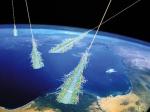 Cosmic Rays
Cosmic Rays
14.08.2006
Have you ever been hit by a beam of high energy particles from above? Surely you have -- it happens all of the time. Showers of high energy particles occur when energetic cosmic rays strike the top of the Earth's atmosphere. Cosmic rays were discovered unexpectedly in 1912.
 The Comet and the Galaxy
The Comet and the Galaxy
13.08.2006
The Moon almost ruined this photograph. During late March and early April 1997, Comet Hale-Bopp passed nearly in front of the Andromeda Galaxy. Here the Great Comet of 1997 and the Great Galaxy in Andromeda were photographed together on 1997 March 24th. The problem was the brightness of the Moon.
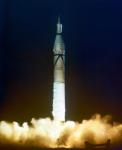 The First Explorer
The First Explorer
12.08.2006
Inaugurating the era of space exploration for the US, the First Explorer, a thirty pound satellite, was launched into Earth orbit on February 1, 1958 by the Army Ballistic Missle Agency. Explorer I carried instruments to measure temperatures, micrometeorite impacts, and an experiment designed by James A.
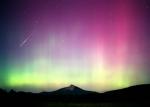 Perseid in the Light
Perseid in the Light
11.08.2006
Dark skies are favored for viewing meteor showers -- so many are pessimistic about this year's Perseids. While the Perseid meteor shower is scheduled to peak this weekend, bright light from an almost full Moon will also flood the night and mask the majority of relatively faint meteors.
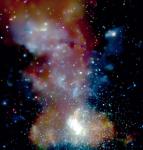 Galactic Center Star Clusters
Galactic Center Star Clusters
10.08.2006
If you had x-ray vision, the central regions of our Galaxy would not be hidden from view by cosmic dust clouds. Instead, the Milky Way toward Sagittarius might look something like this. Pleasing...
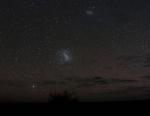 Magellanic Morning
Magellanic Morning
9.08.2006
This early morning skyscape recorded near Winton, Queensland, Australia, looks toward the southeast. Low clouds are seen in silhouette against the first hints of sunlight, while two famous cosmic clouds, the Clouds of Magellan, also hover in the brightening sky.
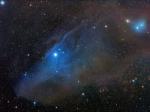 Horse Head Shaped Reflection Nebula IC 4592
Horse Head Shaped Reflection Nebula IC 4592
8.08.2006
Do you see the horse's head? What you are seeing is not the famous Horsehead nebula toward Orion but rather a fainter nebula that only takes on a familiar form with deeper imaging. The main part of the above imaged molecular cloud complex is a reflection nebula cataloged as IC 4592.
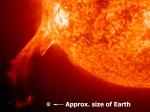 An Erupting Solar Prominence from SOHO
An Erupting Solar Prominence from SOHO
7.08.2006
Our Sun is still very active. In the year 2000, our Sun went though Solar Maximum, the time in its 11-year cycle where the most sunspots and explosive activities occur. Sunspots, the Solar Cycle, and solar prominences are all caused by the Sun's changing magnetic field.
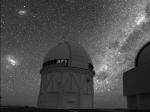 A Cerro Tololo Sky
A Cerro Tololo Sky
6.08.2006
High atop a Chilean mountain lies one of the premier observatories of the southern sky: the Cerro Tololo Inter-American Observatory (CTIO). Pictured above is the dome surrounding one of the site's best known instruments, the 4-meter Blanco Telescope.
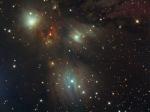 Still Life with NGC 2170
Still Life with NGC 2170
5.08.2006
In this beautiful celestial still life composed with a cosmic brush, dusty nebula NGC 2170 shines at the upper left. Reflecting the light of nearby hot stars, NGC 2170 is joined by other bluish reflection nebulae and a compact red emission region against a backdrop of stars.
|
January February March April May June July August September October November December |
|||||||||||||||||||||||||||||||||||||||||||||||||